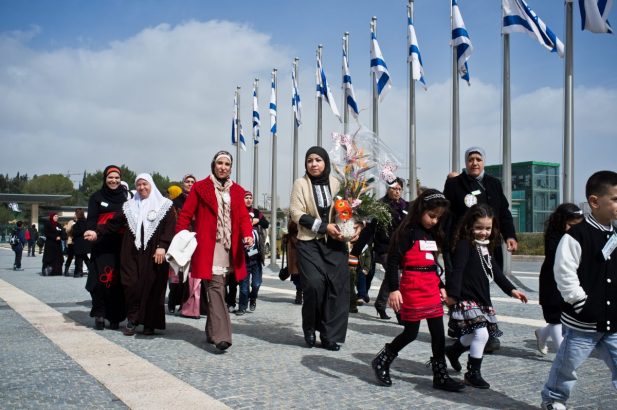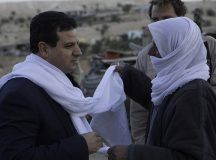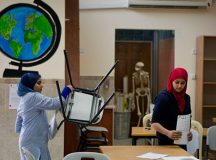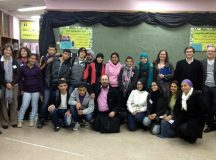Two-thirds of the Arab public want to see their representatives sitting in government. If the Israeli Centre-Left is ever to return to power, it should too.
Israeli elections are fundamentally about parliamentary blocs. Whilst there is some excitement this time around that there could be an alternative to Netanyahu as Prime Minister, the chance of a real change in policy or direction by the Israeli government is stymied by the lack of realistic coalition partners that Benny Gantz, should he win, would be able to attract.
Since the election of Ehud Barak, the centre and Left in Israel has chosen to try and win power without a central pillar of their coalition. When Barak decided that a majority of Israelis was not good enough, but he needed a majority of Jewish Israelis he created a precedent that not only was morally dubious, but strategically disastrous.
Israel’s electoral system accords significant power to small parties. Often driven by fragments of society, these groups can at times play kingmaker. There are two groups who could do this: The Ashkenazi ultra-Orthodox and the Arab citizens of Israel. Both communities have particular concerns. Both communities represent the poorest of Israel.
United Torah Judaism (UTJ) has received between 5-7 seats and has used their power to ensure hundreds of millions of dollars goes to their schools, and that they hold a monopoly of power on issues key to their base. UTJ have little to say about issues of war and peace and the right has been willing to accept almost any condition to keep them in the coalition.
The Arab Joint list received 13 seats in the last election. On average, the Arab parties generate 11-13 seats despite the fact that their turn out in national elections has been depressed since Barak’s decision to exclude them from government on the basis of their ethnicity.
Arab citizens of Israel are the most pro-peace constituency within the country, constantly voting at 20/30 points higher then Jews on their willingness to compromise and accept the Clinton parameters. Delegitimising their voices is crucial in order for right to stay in power, regardless of who heads the government.
Bibi’s last minute plea in the 2015 elections, that the Arabs were ‘voting in droves’, was the opening shot of a four year effort to ensure that the Arab ‘otherness’ prevented their ability to foster any meaningful link up with the Jewish left.
From the Nation State law to the Nakba law, the aim has been to ensure that the Arab narrative was cast outside the bounds of acceptable discourse and to tar and feather any who would seek to work with them. After the municipal elections when Haifa’s Mayor Einat Kalisch-Rotem offered Raja Za’atara of the joint list the deputy mayor position, a firestorm ensued, with the Prime Minister and Interior Minister attempting everything in their power to thwart the arrangement.
In the nascent campaign for the 21st Knesset, Bibi has used the specter of Benny Gantz relying on Tibi’s votes to form a government as a tool of delegitimisation. Fear of the Arabs coming to the polls won Bibi the last election; he hopes that playing the race card again will keep him in the top job.
Many I have spoken to over the years point to rightward trends in Israeli society and feel that if you can’t beat those using a narrative of fear, you should instead join them. The theory is that by appealing to Jewish fears of the Arab other, one can win the day against the annexationist right. The left’s idea has been that the desire for a Jewish majority – if wrapped in the rhetoric of fear – can help the separationist center capture right-wing voters who would rather give up land than accept living amongst more Arabs.
If you believed that peace was but an election away, I could perhaps see the strategic logic despite the moral cost. Yet looking at the attitudes of Palestinians and Israelis, and the lack of any discussion of peace or two states in the current election campaign, an agreement is unlikely to be secured during the next Knesset, as none of the necessary pre-requisites are in place, and there are deep levels of hostility and mistrust.
The Arab citizens of Israel could be the link between Israel and the Palestinians, able to sooth the fear and mistrust that decades of failure has generated. In order for them to be able to play that role however, they need to be respected and included.
In municipal partnerships the bonds between the Arab community and the Jewish community are forged, as grassroots engagement builds a shared society from the ground up. This essential work takes time and patience.
We are not there yet.
Despite all the analysis, campaigning and electioneering, the laws of electoral mathematics are unchanged. There is no path to a centre-Left government in Israel without some iteration of a coalition or a supply arrangement with the Arab bloc, something that the right has continued to make impossible in the current reality.
Gantz could win in April, and still be faced with coalition agreements committing him to a situation whereby progress on the peace process is as remote as ever.
If that is to change, a sincere commitment must be made to bring the Arab citizens of Israel into the political equations that determine government formation. According to the latest polls conducted by the Abraham Initiatives, two thirds of the Arab public want to see their representatives sitting in government. That is a base that can and must be built off, if we are ever to see the centre-Left’s return to power.






































“Palestinians” are a myth; the Arabs who squat on Israeli soil in J&S are Arabs who inmigrated in the early 20th century, after the first Zionists had drained the swamps and removed boulders to make the land arable and capable of sustaining a population. They came from the surrounding Arab countries, from Egypt, Syria, Yemen, Jordan, Iraq. . as soon as there was work there. That gives them no entitlement to the land, that was designated as the home for the Jewish people by Lord Balfour and subsequently by the Treaty of San Remo and the “Mandate for Palestine” by the victorious powers of WWI. There is no “Westbank” only Judea and Samaria. From Morocco to Pakistan there are 350,000 sqmiles of Arab land. May be the Jews can live in their 10,000 sqmiles as masters of their fate in peace?